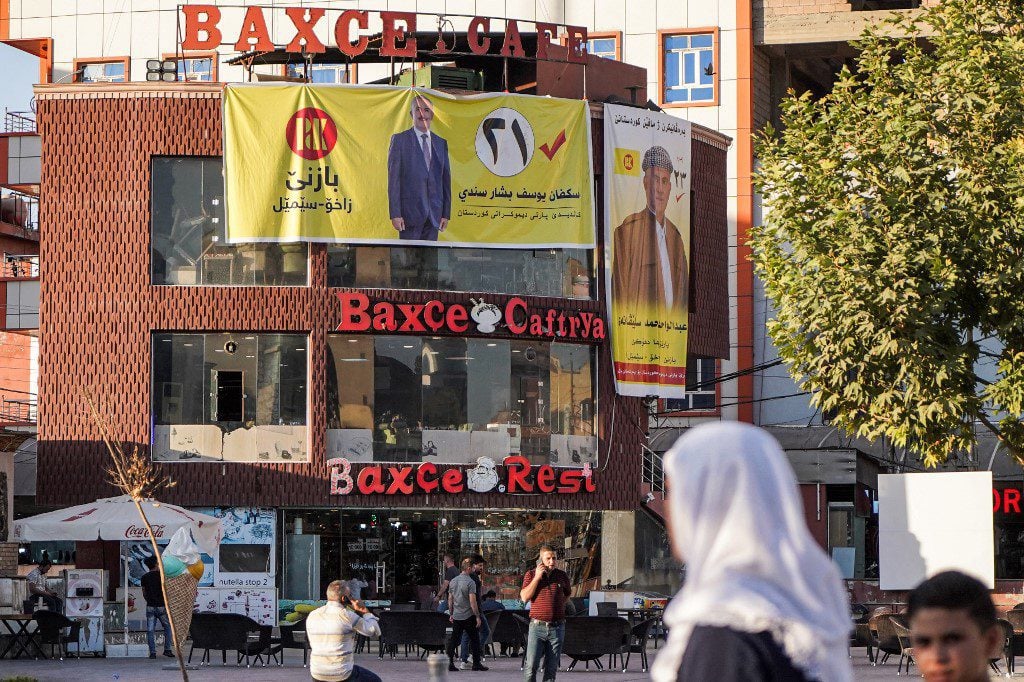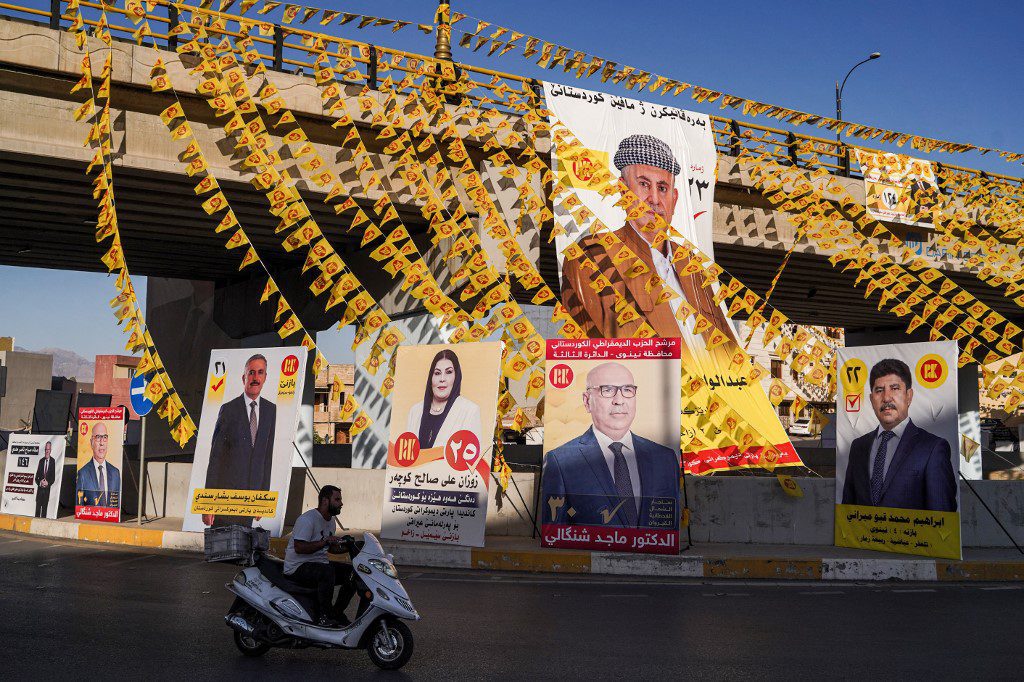
Hussein Al Zoubi
The Kurds in Iraq are the weighing scale and have the final word in the early Iraqi legislative elections scheduled for October 10, 2021. That matter has turned into a political habit in the country, as no parliamentary bloc can win a majority without relying on the Kurdish vote. In this context, Hatim al-samarrai, a researcher in Iraqi affairs, told Fanack that the Kurds can tip the balance between contenders.
After the 2018 elections, the Saairun alliance, led by Shiite cleric Muqtada al-Sadr, and the al-Nasr coalition led by the former Prime Minister Haider al-Abadi managed to form, with other blocs, an alliance 170 seats out of 329. Meanwhile, al-Fatah Alliance, led by Hadi Al-Amiri, formed with other political blocs an alliance comprising 145 seats. At that time, either side would have been able to form a government if it had won the support of the Kurdistan Alliance, which won 43 seats. Therefore, the Kurdish vote is decisive, between the alliances, in determining the majority bloc.
Given that Kurds are a nationality looking for a state, the Kurdish file is one of the most complex files in the region. That aspiration has not yet been achieved, whether in Turkey or Iran, as well as in Syria. However, the Kurds‘ situation in Iraq, who constitute between %15 and %20 of the population, is clearer. The Kurdistan Region has been enjoying a de facto self-governance since 1991 and has officially become so under the 2005 constitution. Its parties always participate in elections, and they often have the final word previously stated.
Political Dominance and Alliances
The two main Kurdish parties, the Kurdistan Democratic Party (KDP) and the Patriotic Union of Kurdistan (PUK), dominate the political scene in Iraqi Kurdistan. The KDP controls the regional government in Erbil. Its historical leadership belongs to Masoud Barzani. The party enjoys a wide presence among the Kurdish clans and seeks to secure recognition of the Kurds’ right to self-determination. It also aims to develop the federal parliamentary system and ensure the Kurds’ participation in Iraqi political decision-making through participation in the institutions of the federal government. On the other hand, the PUK, is currently led by Bafel Talabani, the son of the party’s historical leader and former Iraqi President Jalal Talabani. The party’s control overwhelms areas along the Iranian border, and its headquarters is located in Sulaymaniyah. It is considered a Kurdish party with a liberal and secular orientation, and the party seeks to secure the national rights of the Kurds.
After the 2018 elections, The KDP managed to win 25 seats in the Iraqi parliament, while the PUK won 18 seats. As for the Kurdish parties combined, they won 58 seats. In addition to the KDP and the PUK, the Gorran Movement won 4 seats, while an alliance led by the current Iraqi President Barham Salih won 3 seats. The remaining eight seats belong to independent Kurdish figures.
But this scene may change in the coming elections, as per the two parties’ efforts to build new alliances with parties and movements with less presence in the Kurdish scene, such as the Kurdistan Islamic Union and the Kurdistan Islamic Movement, the Gorran Movement, the New Generation Movement, the Kurdistan Socialist Democratic Party, and the Kurdistan Justice Group.
In this context, there is an informal agreement between the PUK, the Kurdistan Islamic Union led by Salahaddin Bahaaddin, and the Kurdistan Justice Group led by Ali Bapir to support each other’s candidates in various constituencies. The official agreement was signed last summer in Sulaymaniyah, the stronghold of the PUK, between the PUK and the Gorran Movement, to form the Kurdistan Alliance to participate in the elections. The agreement was signed by the co-presidents of the PUK, Bafel Talabani and Lahur Sheikh Jangi, and the General Coordinator of the Gorran Movement, Omar Said Ali. This agreement was interpreted at the time as a tool for reversing the balance of power in Iraqi Kurdistan, considering that it would be a fierce competitor to the KDP among the Kurdish forces in the Iraqi parliament.
But it did not remain so, according to political analyst Shawan Muhammad, as “family” issues emerged within the PUK regarding the party leadership. Lahur Sheikh Jangi, the co-chairman, who was dismissed by his cousin Bafel Talabani, is still undecided about supporting the PUK candidates in the upcoming elections, even though there is talk behind the scenes that he supports a number of them, secretly, not publicly.

Conflicts within the PUK came out into the open after decisions were issued to replace security officials in the Parastin u Zanyari, one of the most sensitive security agencies of the PUK. The head of the apparatus was placed in custody for 24 hours without referring to the leadership of the party’s Political Bureau. Both Bafel Talabani and Qubad Talabani were accused of being behind this quick decision, which was described by media sources close to Lahur Sheikh Jangi as a white coup and a handover of Sulaymaniyah to Barzani’s party, the KDP.
Since the outbreak of this crisis on July 8, 2021, Lahur Sheikh Jangi has remained in his home, even though he is very popular within the party. So far, party leaders have avoided asking Lahur to participate in the election campaigns led by Qubad Talabani, Bafel’s brother. These conflicts are seen by the most prominent competitor, the KDP, as an indication of high chances of winning the majority of Kurdish votes and thus the forefront of the Kurdish blocs in the Iraqi parliament with an ambition of obtaining at least 30 seats.
The PUK’s electoral alliances and internal problems were met by the KDP, the bearer of Barzani’s legacy, with a strategy of deliberation and precision through 51 candidates distributed over 31 constituencies. The party intensified its activity outside the region borders, especially in the Nineveh governorate and its main city, Mosul. Having lots of hope in this governorate, it nominated 14 candidates, distributed over seven out of eight constituencies in the governorate. That indicates the importance of this Sunni Arab majority governorate for the party, as some expected the party to win 6 or 7 seats from it while maintaining the strategy of winning areas in its territory and not allowing opponents to have any presence in them. To do so, the KDP nominated the fewest and most sturdy candidates. Perhaps this is what gave it an advantage over its arch-rival, the PUK. According to a poll conducted by the al-Bayan Center for Studies and Planning, an independent Iraqi institution concerned with providing strategic studies in the various political, security, economic and social fields, the KDP, with its allied movements and figures, scored 7.45 per cent, while the PUK scored 1.83 per cent.
As for the President card, the weight given by the personality of the current president Barham Salih to the PUK was met by the KDP with the former Iraqi Foreign Minister Hoshyar Zebari. According to the sources, he will be the party’s candidate for the Presidency, which must be Kurdish according to the political custom adopted in Iraq after 2003. Zebari is one of the diplomatic figures with wide Arab and regional relations. In addition, he has a rich political experience as a result of being the Minister of Foreign Affairs during one of the most difficult political stages in Iraq, as he held the position in the 2006 and the 2010 governments. As for the popularity, Zebari is Masoud Barzani’s uncle, thus he has momentum in the Kurdish grassroots, especially in Erbil.
Disputed Areas
The two main parties, as well as other parties, prepared for the elections by returning to cities and towns whose administration is disputed with the central government. The Kurdish forces had left these areas following the independence referendum organized by the Kurdistan region of Iraq on September 25, 2017, when the government of former Prime Minister Haider al-Abadi responded with a massive military campaign with the participation of various forces, including the al-Hashd al-Shaabi. At that time, the campaign was able to expel the Peshmerga, the military force of the Kurdistan Region, from Kirkuk and other cities and towns bordering the Kurdistan Region and imposed its full authority on them.
Regarding returning to those areas, the KDP resumed its activity in Makhmour, southeast of Mosul. The HQ of the party was opened, along with two other locations the party had. Other parties, including the PUK, also returned to the oil-rich city of Kirkuk, north of Baghdad. A few weeks ago, election campaigns were organized and concentrated in Kurdish neighbourhoods. These moves come as part of a complete settlement for the return of the Kurdish partisan forces to the areas where Iraqis of Kurdish nationalism reside to practise their political activities, which will extend to Tuz Khurmatu in Salah al-Din Governorate and Khanaqin in Diyala Governorate.
The return of the Kurdish parties to the areas from which they left did not meet any opposition from the active political forces. That is because of the political blocs’ keenness to satisfy the Kurdish political forces in anticipation of parliamentary alliances. However, some voices, including a member of the State of Law coalition, Muhammad al-Sihoud, had reservations about this return, considering that it might pave the way for things to return to the way they were before 2017.
Al-Sihoud said that government decisions, especially those supported legally and by the parliament, “do not fall into a statute of limitations.” He also expressed his fear that there might be connections between Erbil and Baghdad to install the current government for another term, in reference to the government of Mustafa Al-Kadhimi. That confirms once again, according to al-samarrai, that the Kurds in Iraq are the kingmakers in most elections. As for the political reality in Iraqi Kurdistan, al-samarrai believes that the formal and informal alliances held by the Kurdish political forces inside or outside the Kurdish milieu will not affect the political map in the region, especially since the competition will remain mainly between the KDP and the PUK.


